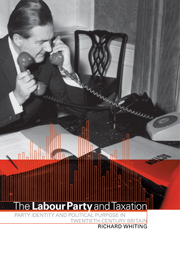Book contents
- Frontmatter
- Contents
- List of tables
- Acknowledgements
- List of abbreviations
- Introduction: Taxation and political debate
- 1 Struggles within a liberal inheritance, 1906–1940
- 2 The changing balance of tax interests, 1940–1954
- 3 The Kaldor era, 1951–1965
- 4 Social democracy examined, 1965–1970
- 5 Defensive positions, 1970–1979
- 6 Epilogue: New Labour, old problems?
- 7 Conclusion
- Select bibliography
- Index
7 - Conclusion
Published online by Cambridge University Press: 07 August 2009
- Frontmatter
- Contents
- List of tables
- Acknowledgements
- List of abbreviations
- Introduction: Taxation and political debate
- 1 Struggles within a liberal inheritance, 1906–1940
- 2 The changing balance of tax interests, 1940–1954
- 3 The Kaldor era, 1951–1965
- 4 Social democracy examined, 1965–1970
- 5 Defensive positions, 1970–1979
- 6 Epilogue: New Labour, old problems?
- 7 Conclusion
- Select bibliography
- Index
Summary
Labour's involvement with taxation has been set in a paradox. At a general level its philosophy has held sway, and yet its particular achievements have been disappointing. Progression, the core principle of the tax system that worked in Labour's favour, went largely unchallenged for much of the century. Yet the outcome of Labour's efforts to use existing taxes more effectively and to devise new ones to satisfy its aims has been a failure. The explanation for this lies in the asymmetrical nature of tax debate set out in the introduction to this book.
Labour has found that some of the key components of its tax philosophy have gone unopposed by the Conservatives. This may seem a rather odd judgement to make, since for much of the time Labour has felt itself to be on the defensive about tax, and it has been the issue through which voters have shown greatest concern about Labour's aims and capabilities. Yet the challenge to Labour has usually been about the levels rather than the principles of taxation. Labour as a ‘tax and spend’ party has been a frequent characterization of Conservative argument; Labour as the guardian of progressive taxation has been almost unheard. Yet progressivity, the idea that a tax deduction rises more than proportionately with income, is at the heart of a democratic or radical view of tax. Its supports of a theoretical kind have long been exhausted.
- Type
- Chapter
- Information
- The Labour Party and TaxationParty Identity and Political Purpose in Twentieth-Century Britain, pp. 269 - 273Publisher: Cambridge University PressPrint publication year: 2001



